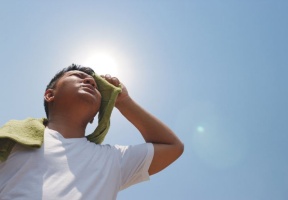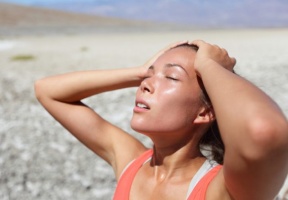

By: Ashmar Mandou
With the heat index soaring over 100 degrees this past weekend, physicians at the Cook County Health (CCH) urged Chicagoans to take measures to stay cool. As warmer temperatures loom over the city, Dr. Trevor Lewis, interim chair of emergency medicine at Cook County Health shares the risk of heat exhaustion and preventable measures to survive another heatwave.
Lawndale News: What happens to the body as a result of exposure to extreme heat?
Dr. Trevor Lewis: The human body is generally able to cool itself. However, in extreme heat our bodies have to work harder to keep cool. That is why you may notice that you sweat more when the temperature is warmer as that is our body’s way of telling itself to cool down. If you start to experience more serious symptoms such as light-headedness and nausea, seek a cool place quickly and make sure to hydrate.
LN: Who is at greatest risk for heat-related illness?
Dr. Lewis: Infants, seniors and people with pre-existing medical conditions are most at-risk for heat-related illness. If you have elderly friends and family, go and check on them. People who work outside are also at an increased risk and need to be more careful in extremely hot weather. Be sure to keep your pets safe, too.
LN: What is heat stroke?
Dr. Lewis: Heatstroke is when the body can no longer regulate its temperature in extremely hot weather. When this happens, it needs to be treated immediately because if it is not, the body’s major organs can be damaged and death can occur in severe cases.
LN: What is heat exhaustion?
Dr. Lewis: Heat exhaustion is the phase before heat stroke. Common symptoms include excessive thirst and sweating, dizziness, mild headache, and fatigue. People may feel cold or clammy, while still sweating.
LN: What are the warning signs of a heat stroke?
Dr. Lewis: Symptoms include severe headaches, dizziness, weakness, confusion and hot flushed skin without sweating. Patients’ temperatures may exceed 103 degrees Fahrenheit. If you are experiencing these symptoms, try to cool off immediately and seek medical care. Heatstroke can be a life-threatening condition, so paying close attention to these signs is critical.
LN: What are the warning signs of heat exhaustion?
Dr. Lewis: With heat exhaustion you can experience excessive sweating, fatigue and nausea. You should seek a cool place and hydrate to cool down your body. Taking a cool shower or bath can be helpful to lower your body’s temperature.
LN: What steps can people who work outdoors take to prevent problems?
Dr. Lewis: Make sure to stay hydrated throughout the day, wear light-colored, loose-fitting clothing and do not forget to apply sunscreen. People who work outside should take regular breaks to cool off and keep an eye on others around them. If you see someone struggling, try to get him/her cooled off to prevent any serious inquiry.
LN: What are the best ways to prevent heat-related illness?
Dr. Lewis: Heat-related illnesses are preventable, so taking precautions to ensure we regulate our body’s temperature is essential in a heat wave. This can be done by keeping hydrated with enough water and taking breaks from the heat when we feel our bodies start to get sluggish. For people that do not have access to a cool place, Cook County has cooling centers located throughout the county. Be sure to also check on friends and family who may need help.









